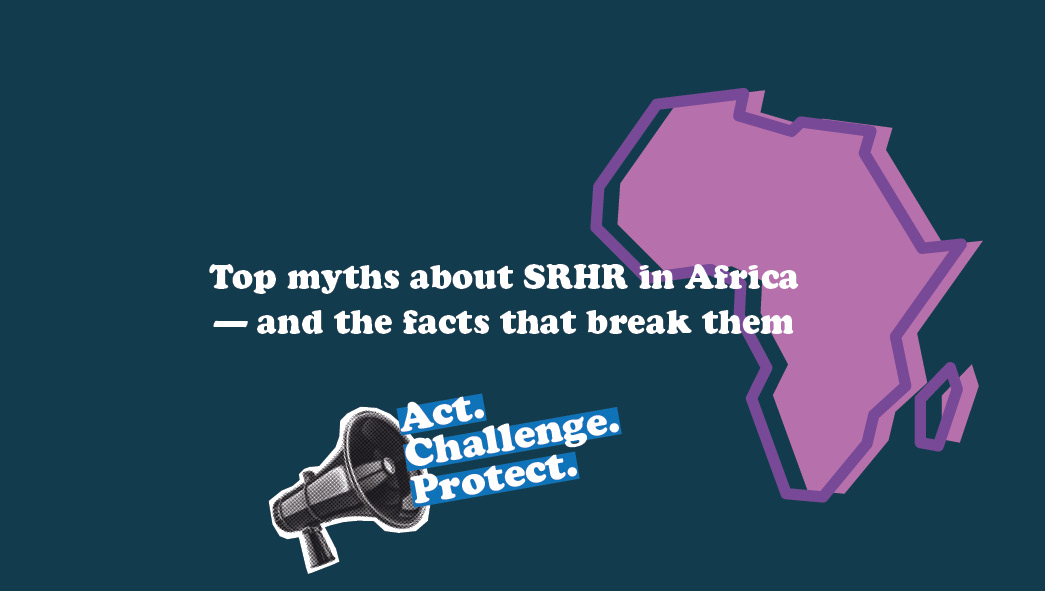Top myths about SRHR in Africa — and the facts that break them
#ActForSRHR | #SRHR4All | #VoicesForSRHR
Fighting Myths. Protecting Rights. Acting for change.
Across Africa, many wrong ideas about sex, health, and identity continue to hurt people.
These myths cause shame, fear, and stop women, young people, LGBTQI+ people, and persons with disabilities from getting the care and respect they deserve.
That’s why we have to #ActForSRHR.
We are here to:
Act against lies. Challenge wrong ideas. Protect everyone’s rights.

Here are the most dangerous myths — and the truth to break them.
MYTH 1: “Only people who sleep around get STIs.”
TRUTH: Anyone who has sex — even once — can get an STI.
Testing is smart. It keeps you and others safe.
You cannot tell by looking if someone has an STI. (Source)
MYTH 2: “Contraceptives make you infertile.”
TRUTH: Birth control is safe and does not stop you from having children later.
You can choose when the time is right for you. (Source)
MYTH 3: “Only married women should get family planning.”
TRUTH: Everyone has the right to decide if and when to have children — whether married or not. (Source)
MYTH 4: “You can see if someone has an STI.”
TRUTH: Most STIs show no signs.
Only testing can tell.
Judging people by how they look is wrong. (Source)
MYTH 5: “Homosexuality is un-African.”
TRUTH: LGBTQI+ people have always been part of African communities.
Love and respect are African values too. (Source) Amnesty International
MYTH 6: “Abortion is always illegal in Africa.”
TRUTH: Many African countries allow abortion in special cases like rape or danger to health.
In Ethiopia, it’s allowed in some cases. In South Africa, it’s allowed up to 12 weeks. (Source)
MYTH 7: “People with disabilities shouldn’t have children.”
TRUTH: Disability does not stop anyone from being a loving parent.
Everyone deserves the right to choose if, and when to have a family, and how many children to have. (Source)
MYTH 8: “Sex education makes young people promiscuous.”
TRUTH: Good sexuality education helps young people make better, safer choices.
It teaches respect, consent, and confidence. (Source)
Quick facts to remember
- Anyone can get an STI, regular testing helps you make informed decisions and protects your health.
- Using condoms correctly and consistently is one of the best ways to prevent STIs and unplanned pregnancy.
- Birth control is safe, and it’s your choice.
- LGBTQI+ people belong, and always have.
- Abortion is legal in some African countries under specific conditions.
- Persons living with disabilities have the right to love, sex, and to have families too.
Why this matters to you
- You deserve safe, respectful health care.
- You deserve real facts, not lies or shame.
- You deserve the right to love, live, and make your own choices.
- When we break myths, we build power.
- When we share truth we save lives.
Challenge: Bust one myth this week!
- Talk to a friend or family member.
- Share a fact on WhatsApp.
- Speak up at school, work, or in your community.
- Every conversation brings us closer to freedom, dignity, and justice.
What you can do
✅ Share the facts.
✅ Speak up when you hear misinformation.
✅ Use #ActForSRHR to spread the truth.
✅ Follow @MenEngageAfrica for updates.
Why busting myths matters
- Lies cause shame and fear.
- Lies stop people from getting help.
- Lies kill trust, health, and dreams.
- The truth saves lives.
The lies are loud.
But our voices are louder.
The myths are deadly.
But the truth saves lives.
Together, we can Act. Challenge. Protect.
Because SRHR is not just about rights —
It’s about freedom, dignity, and hope.
For every BODY.
For every future.
For Africa.
For us.



